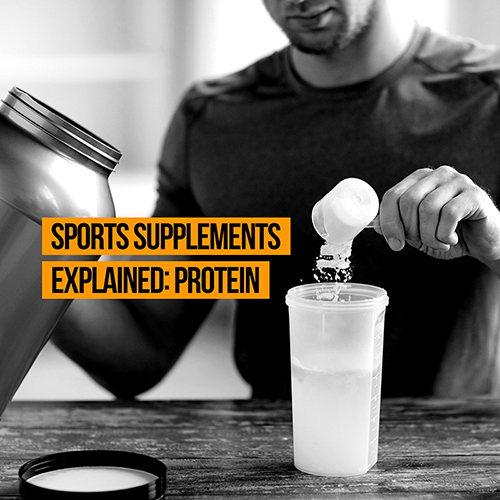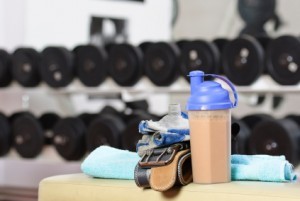The world of sports supplements is one of the most hotly disputed yet highly marketed enterprises within the world of health and fitness. Set against billions of dollars’ worth of industry, the micro-economy has sky rocketed since the 1980’s. Toby Cryne discusses the most common products on the market and how they can (or can’t) benefit you. This week, he focuses on protein.
Like it or not, we are all hamsters on an ever growing wheel of fortune. The health and fitness world with all of its contraptions, workout methodologies and sports supplements is one of the most hyperactive markets that the world has ever seen. Every week a new method, supplement or technique adorns the front cover of popular health magazines. Each promising you the body that you deserve in short, often ridiculous time frames. If that wasn’t enough, your gym is no doubt littered with murals of steroid infested fitness models, who sell the supposed potions, pills and powders that have helped them achieve the body that they show off. Like the witch-doctors of old times, these expertly marketed sex objects project their elixirs to the gullible masses and the naive.
The global sports supplement industry alone is projected at being worth over £3bn a year, a figure that is only going to rise as both the scientific and sporting worlds continue their increasing love affair. No longer just concoctions for those on the fringes of the bodybuilding world, it seems that everyone owns a protein shaker.
But what are sports supplements, how do they work and how, more importantly can they benefit you on your long, arduous (some say never-ending) journey towards the body that you desire?
Supplements NOT Steroids
When I first started training nearly ten years ago, to utilise anything in powder form was largely viewed as a sketchy, almost dangerous habit. I must admit, when first seen sporting an oversized tub of whey protein, the first reaction from my parents at the time was one of major concern. After all, without any real knowledge I had thrown myself into a world that had many negative connotations. Steroids after all, were and still are deemed as largely unsafe, not to mention that they are illegal. Without any real basis for my trials, I had gone out and purchased (or rather, been sold) something that friends and family deemed as illegal and unsafe. They weren’t, obviously, I had merely purchased whey protein. However, at the time any powdered material in my household was deemed as such.
Regardless, I tried many different products over the years from mass gainers to weight loss supplements and creatine. I got a little bigger, got a little smaller and got a little stronger. It was a learning curve in which I spent a lot of money, got a lot of stick and generally wondered around clueless as to why I was taking what I was taking and whether it was actually of any benefit. If only I had known then what I do now. Alas, hindsight is a beautiful thing.
Without going on a tirade against the industry, an important subject to note is the self-regulating nature and lack of governance with regards to the labelling of many products. In terms of UK law, the companies need only label the nutrients of said products alongside warnings and best practice usage. What this means however, is that often products are labelled as anabolic, thermogenic or even steroid alternatives when the reality is that though some of their ingredients may contain said properties, the dosages are so low that the effect is actually negligible. Nevertheless, the gullible army still throw away their hard-earned. Needless to say, I was one of these gullible masses.
But that doesn’t mean that the world of sports supplementation is one of merely product manipulation. Reputable brands take part in independent testing and are tied to athletes and sports clubs. So long as one realises that supplements are just that, supplemental, and will not create bodies of gods without work, supplementation can be an exceptionally important and beneficial aspect of sports recovery.
Protein Explained
What is it?
Protein is commonly known as the building block of life. As such, it is the most important factor in cell generation, maintenance and repair. In simple terms, proteins are responsible for your growth on a cellular level.
The human body is in a constant state of regeneration, especially when exercise is undertaken. When one ‘works out’ the body is put under large amounts of physical stress. In the field of weight training, exertion causes muscle tissue to break down on a chemical level before being rebuilt to better cope with the physical demands.

In layman’s’ terms; if a bodybuilder wishes to create a larger, stronger chest, he or she will lift an appropriate weight which targets the muscle groups in the chest. The weight, which is greater than the daily demands placed on the chest, will cause the fibres of the muscle to break down chemically. In turn, the body will rebuild the area to be better able to cope with the demands of the stimulus by being stronger and larger (though this is determined by the type of stress placed on it). The body can only do this with the assistance of the essential nutrient protein. Of course, this is a highly simplified version of the events. This guy has an even more easy to understand explanation:
How do you take it?
As previously mentioned protein is the building block of life and as such, features in every living thing. Chicken, turkey, tuna and eggs are commonly seen as the gold standard of complete proteins (see amino-acids) but non-meat items such as beans, nuts, seeds and tofu also contain large amounts of dietary proteins though these aren’t always complete.
In order to ingest and digest the amount of protein needed through normal foods, one usually has to ingest and digest many other nutrients. This is one of the primary reasons why many athletes and workout warriors choose to take protein supplements as they are often lower in calorie to nutrient ratio and easier for the body to digest. The current UK dietary recommendations are 0.75g per kg of body-weight for sedentary folk, though this figure varies massively depending on the exercise level and goal of each individual.
Who should use it?
Meredith et al, (1992) documented the importance of protein in muscle building determining that a combination of weight training and a protein supplement containing 23g of protein per serving enhanced muscle gains when compared to those training without the supplement. Many studies like this exist throughout the scientific world, most of which conclude that the optimum level for muscle building sits at around the 1.7g – 1.8g of protein per kg of bodyweight with little evidence showing that larger amounts equate to larger gains.
That said protein is not simply a supplement for use in mass gaining. Endurance athletes need a larger volume of carbohydrate than just about every other athletic endeavour. That said, endurance athletes can also benefit from a larger amount of protein required than sedentary folk, this is due to the stresses placed on the body during harder workouts such as sprinting. Though protein is rarely used for fuel and the body will specifically avoid using it unless it absolutely has to, an increase in protein from the 0.75g per kg base line anywhere up to 1.8g can be beneficial.
When do I use it?
Nutrient timing is one of the often forgotten rules of sports specific training and, if done wrong can greatly hinder your performance. Immediately following a tough workout, specifically involving resistance training, the body goes into a catabolic state. In this state, the muscles are being broken down on a cellular level. In order to help the cells regenerate as quickly as possible an easily digestible protein is needed to supercharge into the working muscles and help to rebuild. This is where protein supplements come into their own as an easily digestible fuel injection of the nutrient that goes right to work repairing the body. Science repeatedly shows that protein supplementation within 30 minutes of finishing exercise is the ideal timing for optimum muscle recovery. Any later than that and muscle repair will not be as great as possible which could leave you lagging by the time you next hit the gym or the pavement.
Choosing your protein
The murky world of sports supplementation is a bit of a tough one to traverse. After all, products exist in every supermarket, fitness centre and even chemist. So which should you choose and why? With literally millions of products on the market from isolate whey proteins which contain minimal carbohydrate and fat to soy and other meat free versions, it would be impossible for me to say. However, a few rules to stick to when buying your protein powders are thus:
- Look for a product which contains at least 20g of protein per serving
- For best recovery results a 3:1 carbohydrate to protein ratio is recommended so avoid isolate products.
- If you can’t pronounce anything on the ingredients list, don’t buy it. Look for products with as few ingredients as possible.
- Disregard flavour over nutritional quality. No matter what the box says, it will NOT taste like a McFlurry – don’t kid yourself.
- Just because your protein isn’t the most expensive, doesn’t mean it’s not as good. Often the most expensive brands are packed full of useless additives that no one really needs.
Needless to say I’m sure, protein supplements are not the magic potion which will turn you into Hercules, nor are they mere fiction. With the correct nutrient timing and exercise regime, protein supplements can be exceptionally beneficial to muscle building, weight loss and even recovery following endurance training. So long as one chooses ones supplement wisely and avoids the hysteria of mass marketed hyperbole, protein powders and ready made drinks can assist in just about every sporting capacity. Just never EVER buy banana flavour.
The next episode
In next weeks’ edition we will be looking into the fragmented realm of fat burners and weight loss aids to decide whether they are fact, fiction or pure fad



